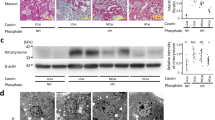Summary
Patients with chronic renal failure are prone to develop negative nitrogen balance resulting clinically in wasting and malnutrition. To study the role of glucocorticoids in the pathogenesis of uremic catabolism, we determined urinary excretion rates of urea and Nt-methylhistidine in chronically uremic rats with and without RU 38 486, a potent antiglucocorticoid. In comparison to pair-fed non-uremic animals, chronically uremic rats displayed significantly enhanced ureagenesis, as demonstrated by increased urinary urea excretion, and myofibrillar protein breakdown, as indicated by increased excretion rates of urinary Nt-methylhistidine. The administration of RU 38486 to chronically uremic rats, however, did not result in a normalization of urinary excretion of Nt-methylhistidine. Similarily, the antiglucocorticoid did not influence the extent of ureagenesis in our uremic animals, as it was demonstrated by comparable levels of urinary urea excretion. This suggests that glucocorticoids are not involved in the pathogenesis of enhanced catabolism in chronic renal insufficiency.
Similar content being viewed by others
References
Mitch WE, Clark A (1983) Muscle protein turnover in uremia. Kidney Int 24 [Suppl 16]:2–8
Kopple JD (1978) Abnormal amino acid and protein metabolism in uremia. Kidney Int 14:340–348
Zern MA, Yap SH, Strair RK, Kaysen GA, Shafriz DA (1984) Effects of chronic renal failure on protein synthesis and messenger ribonucleic acid in rat liver. J Clin Invest 73:1167–1177
Garber A (1978) Skeletal muscle protein and amino acid metabolism in experimental chronic uremia in rat: Accelerated alanine and glutamine formation and release. J Clin Invest 62:623–632
Fröhlich J, Schollmeyer P, Gerok W (1978) Carbohydrate metabolism in renal failure. Am J Clin Nutr 31:1541–1546
Mitch WE, Walser M (1986) Nutritional therapy of the uremic patient. In: Brenner BM, Rector FC (eds) The kidney, edn 3. Saunders, New York, pp 1759–1790
Defronzo RA, Alvestand A, Smith D, Hendler R, Hendler E, Wahren J (1981) Insulin resistance in uremia. J Clin Invest 67:563–570
Li JB, Wassner SJ (1986) Protein synthesis and degradation in skeletal muscle of chronically uremic rats. Kidney Int 29:1136–1146
May RC, Kelly RA, Mitch WE (1987) Mechanisms for defects in muscle protein metabolism in rats with chronic uremia. J Clin Invest 79:1099–1103
May RC, Kelly RA, Mitch WE (1986) Metabolic acidosis stimulates protein degradation in rat muscle by a glucocorticoid dependent mechanism. J Clin Invest 77:614–621
Mishkin MS, Hsa TH, Walker WG, Bledsoe T (1972) Studies on the episodic secretion of cortisol in uremic patients on hemodialysis. Johns Hopkins Med J 131:160–164
Gagne D, Pons M, Philibert D (1985) RU 38486 — a potent antiglucocorticoid in vitro and in vivo. J Steroid Biochem 23:247–251
Gomez-Sanchez C, Murry B, Kem D, Kaplan N (1975) A direct radioimmunoassay of corticosterone in rat serum. Endocrinology 96:796–798
Jung-Testas I, Baulieu E (1983) Inhibition of glucocorticosteroid hormone action in cultured L-929 mouse fibroblasts of RU 486; a new antiglucosteroid of high affinity for glucosteroid receptor. Exp Cell Res 147:177–182
Moguilowsky M, Philibert D (1984) RU 38486: Potent antiglucocorticoid activity correlated with strong binding to the cytosolic glucocorticoid receptor followed by an impaired activation. J Steroid Biochem 20:271–276
Schaefer R, Weipert J, Moser M, Peter G, Heidbreder E, Hörl W, Heidland A (1988) Reduction of urea generation and muscle protein degradation by adrenalectomy in acutely uremic rats. Nephron 48:149–153
Schaefer RM, Teschner M, Kulzer P, Leibold J, Peter G, Heidland A (1987) Evidence for reduced catabolism by the antiglucocorticoid RU 38486 in acutely uremic rats. Am J Nephrol 7:127–131
Tischler ME (1981) Hormonal regulation of protein degradation in skeletal and cardiac muscle. Life Sci 28:2569–2576
Tomas E, Munro H, Young V (1978) Effect of glucocorticoid administration on the rate of muscle protein breakdown in vivo in rats, as measured by urinary excretion of Nt-methylhistidine. Biochem J 178:139–146
Millward D, Bates P, Grimble G, Brown J, Natahn M, Rennie M (Nt-methylhistidine: quantitative importance of non-skeletal muscle sources of Nt-methylhistidine in urine. Biochem J 190:225–228
Li J, Wassner S (1981) Muscle degradation in uremia: 3-methylhistidine release in fed and fasted rats. Kidney Int 20:321–325
Nieman LK, Loriaux DL (1987) Clinical applications of the glucocorticoid and progestin antagonist RU 486. In: Agarwal J (ed) Receptor-mediated antisteroid action. Walter de Gruyter, Berlin New York, pp 77–97
Author information
Authors and Affiliations
Rights and permissions
About this article
Cite this article
Teschner, M., Schaefer, R.M., Rudolf, C. et al. Independence of enhanced protein catabolism from glucocorticoids in chronically uremic rats. Res. Exp. Med. 189, 339–345 (1989). https://doi.org/10.1007/BF01855039
Received:
Accepted:
Issue Date:
DOI: https://doi.org/10.1007/BF01855039




